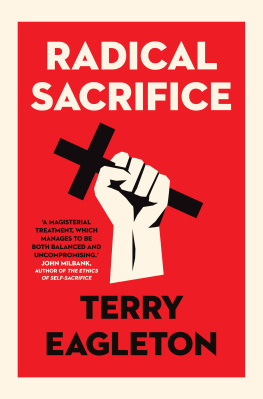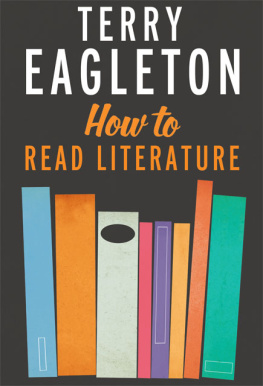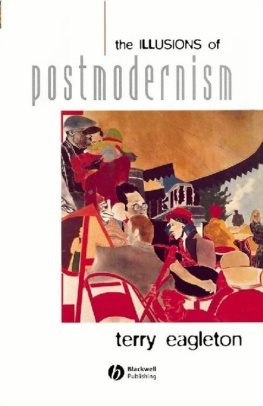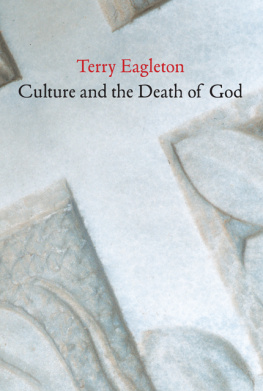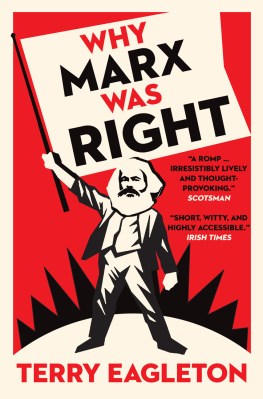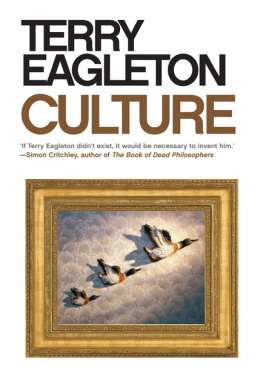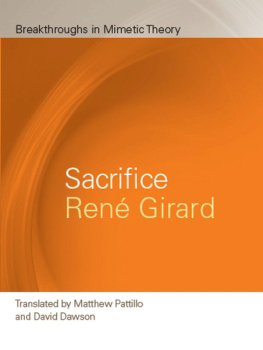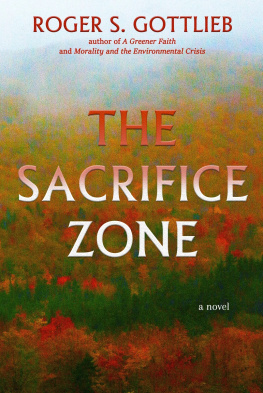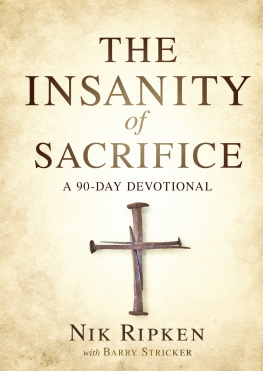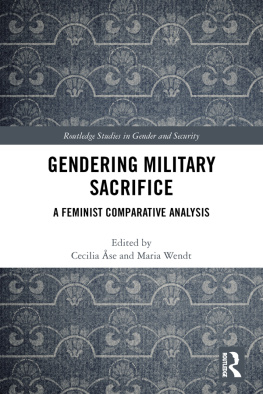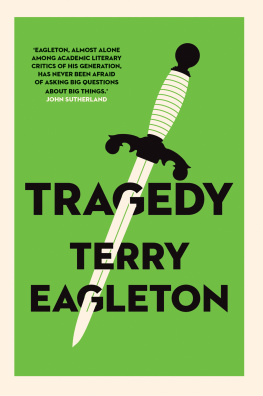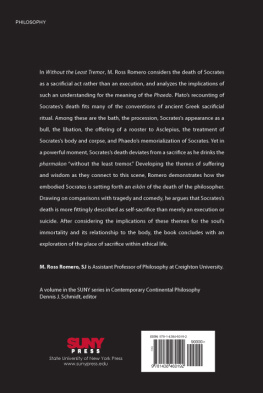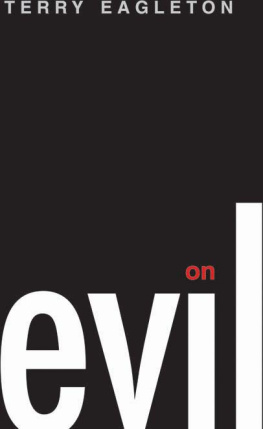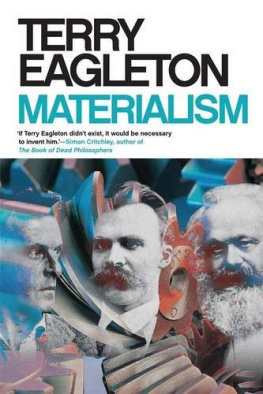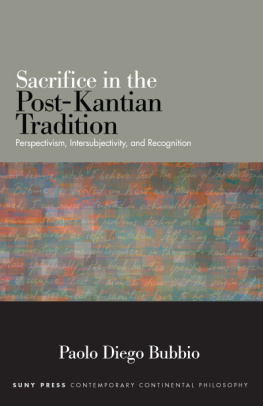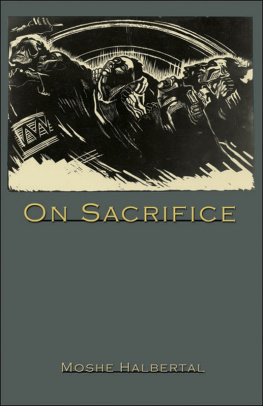RADICAL SACRIFICE
Copyright 2018 Terry Eagleton
All rights reserved. This book may not be reproduced in whole or in part, in any form (beyond that copying permitted by Sections 107 and 108 of the U.S. Copyright Law and except by reviewers for the public press) without written permission from the publishers.
For information about this and other Yale University Press publications, please contact:
U.S. Office:
Europe Office:
Set in Arno Pro by IDSUK (DataConnection) Ltd
Printed in Great Britain by TJ International, Padstow, Cornwall
Library of Congress Control Number: 2017963163
ISBN 978-0-300-23335-3
A catalogue record for this book is available from the British Library.
10 9 8 7 6 5 4 3 2 1
For the Carmelite Sisters of Thicket Priory
When someone freely embraces the symbols of death, or death itself... a great release of power for good can be expected to follow.
Mary Douglas, Purity and Danger , 1966
CONTENTS
PREFACE
The chapters of this book are part of a broader project, one that turns on a set of ideas which seem to have become central to my later work: death, tragedy, sacrifice, dispossession and the like. For readers who might find these conceptions rather too gloomy, I should add that there is also a good deal in the study about renewal, transformation and revolution, which I see as the other face of the darker notions I have just listed.
Like some other of my recent works, then, this one broods upon questions not commonly investigated by the political left, and certainly not by its postmodern wing. Love, death, suffering, sacrifice, evil, martyrdom, forgiveness and so on are not exactly modish preoccupations among cultural or political theorists today. They are more usually the concern of theologians; and if I myself do not take the dismissive attitude to theology generally to be found among left-wingers, this is because, through a quirk of upbringing, I happen to know a little about it. I know enough, anyway, to be convinced that a great many secular views of the Judaic and Christian lineages are as grossly prejudiced and abysmally ill-informed as those, say, for whom socialism is simply a matter of the Gulag, or feminism the calamitous consequence of women throwing their natural modesty and decorum to the winds. One of the more polemical aims of this book, then, though one that remains largely implicit, is to show up some of these attitudes for the lamentable travesties they are. When it comes to theology, even the most subtle of secular thinkers are at risk of stumbling into a mire of dreary clichs and risible misconceptions.
It is, in fact, no more strange that one like myself indebted to the Marxist legacy should take an interest in theology than that a liberal or social democrat should take an interest in Stendhal or Flaubert. For Marxism is a theory and practice of historical change, not a vision of human existence, and as such is not intended to have anything particularly arresting to say about evil or mortality, suffering or forgiveness, tragic breakdown or the nature of nihilism. For such questions, one tends rather to have recourse to Dostoevsky or St Paul, Shakespeare or Sebald.
I am grateful to my copy-editor, Charlotte Chapman, for her exceptionally efficient and meticulous work. In this, she maintains the extraordinarily high standards of my previous copy-editor at Yale, the erudite and perspicacious Jenny Roberts. I am also deeply grateful to Timothy Radcliffe OP, who gave the book a splendidly scrupulous reading and made a number of illuminating comments on it. My thanks also go to Sam Dunnett, who proved himself to be an excellent research assistant.
Chapter 1
RADICAL SACRIFICE
S ACRIFICE HAS NOT proved the most glamorous of notions in the modern age; it smacks of self-abasement and punitive self-denial. It is what long-suffering wives do for their imperious husbands, maidservants for their pampered mistresses, nurses and steelworkers for the good of the economy and storm troopers for the Fatherland. An exhausted mother in Edward St Aubyns novel Mothers Milk , her life in pieces and her desires unfulfilled, speaks of the tyranny of self-sacrifice. The notion is redolent of masochism, self-loathing and a morbid antipathy to what makes for life. It begins as an attempt to placate a savage God and culminates in the clarion call of the fascist Fatherland, with its necrophiliac rites and ceremonies of self-oblation. J.M. Coetzee writes in Life and Times of Michael K of how someone may be simply another brick in the pyramid of sacrifice that someone would eventually climb and stand straddle-legged on top of, roaring and beating his chest and announcing himself emperor of all he surveyed. G.W.F. Hegel, a thinker sometimes mistakenly thought to take a sanguine view of the human condition, writes, Even as we look at history as the slaughter bench on which the happiness of nations, the wisdom of states and the virtue of individuals have been sacrificed, a question also necessarily arises in our thoughts: to what final end have these monstrous sacrifices been made?
For conventional liberal wisdom, self-fulfilment and self-dispossession are essentially at odds. This is not the case for a more radical outlook. One must take a remarkably indulgent view of humankind, as many a liberal does, to assume that the self can come into its own without that fundamental breaking and refashioning of which sacrifice has been one traditional sign. It would be the equivalent of claiming that the forms of political life we see around us could evolve into a state of justice without any notable degree of turbulence. Those who oppose sacrifice to the mutuality of love forget that any durable version of the latter involves the self-giving typical of the former. There is indeed a species of sacrificial love that involves wreaking violence upon the self. The problem is to refuse this death-dealing ideology while recognising with Hegel that in a more fruitful sense of the term, the inner structure of love is sacrificial in any case though we are speaking once again of reciprocal self-giving, not of the abject capitulation of one partner to the dominion of the other. As one commentary puts it, sacrifice and self-denial are not a goal in themselves but the substance of forgetting ones own [self] in loving the other. Forgetting is a questionable claim, given that love enhances the self in the very act of decentring it. Even so, it provides a useful corrective to the fashionable view that sacrifice is necessarily a form of self-mutilation.
That orthodoxy has been well-nigh unanimous in repudiating the concept of sacrifice as barbarous and benighted. In the wake of Thomas Hobbes, for whom the highest moral duty is self-preservation, Ronald Dworkin claims that ones responsibility for others cannot extend to excessive self-sacrifice, given that ones primary obligation is to ones own life. It is a brand of ethics well suited to middle-class suburbia. There is indeed in Dworkins view a moral duty to come to the aid of others, but only if the difficulties they face are severe, the cost of the assistance is tolerable and those who require such help depend on you in particular to provide it. It is remarkable that when the term sacrifice enters the discussion, the modern liberal mind turns spontaneously to such issues as domestic servitude and death in the cause of military glory, rather than to the career of Constance Markievicz or the death of Malcolm X.
The modern eras scepticism of sacrifice is nowhere more evident than in its uncertain grasp of the notion. By and large, it has come to mean the voluntary relinquishing of what one finds valuable. But renunciation is only one feature of sacrifice, and not always the most prominent. It is true that it can play a major role in the practice. In his classic study Primitive Culture , the Victorian anthropologist Edward Burnett Tylor argues that the sacrificial gift is prized by the gods not for itself but as a token of the worshippers yielding up of something precious. The gift must be part of ones own substance, so that to surrender it exacts a certain cost.

